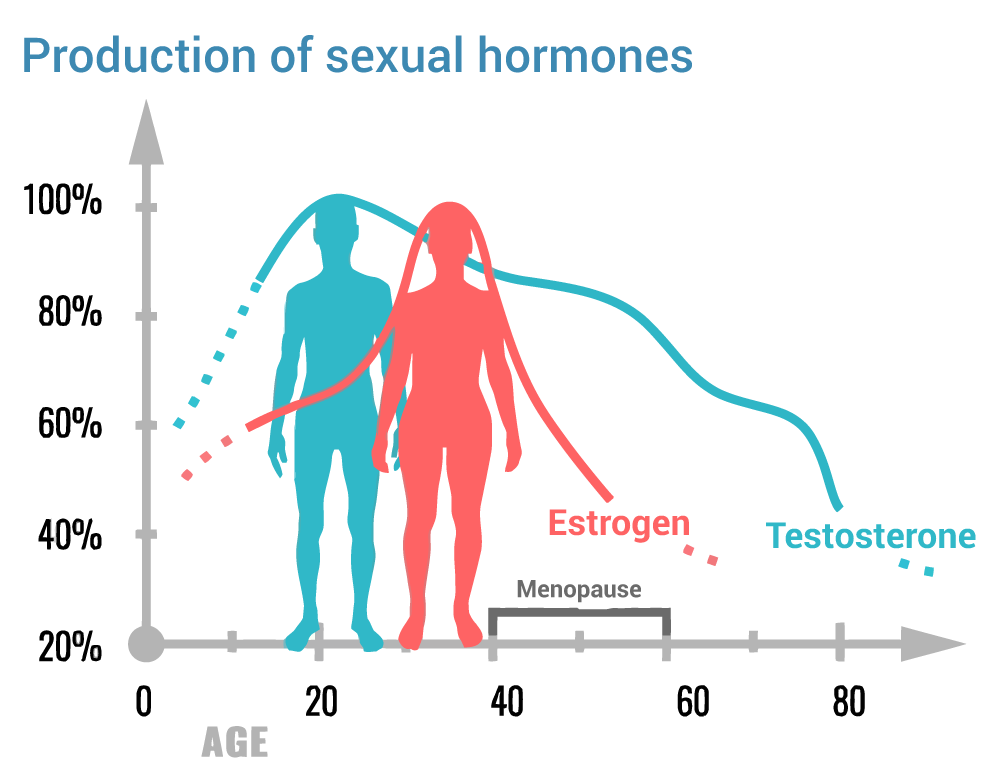Testosterone Replacement Therapy (TRT)
Low testosterone in men
Testosterone is a male hormone secreted mainly by the testes and secondarily by the adrenal glands. Often considered the hormone of sexuality, It actually has many roles in the body. It is an energizing hormone that tones muscles and mood, it strengthens bones.
Testosterone circulates in the blood in two forms:
Total. Bound to the SHBG protein = little effect on the body.
Free. Bioavailable = available to the body

Dr. Cooremans diagnoses low testosterone based on a personal survey, on full physical examination, and on the results of two blood tests since levels can fluctuate daily.
Even if your testosterone /hGH levels are low and you have related symptoms, therapy is not always a first or necessary step to take. If we identify possible causes - such as diabetes, weight gain, high estrogen level, anxiety and low DHEA/pregnenolone or even in some cases medication being taken - our priority will be to focus on resolving these problems (first).
The concept of "Pregnenolone steal" states that since all steroid hormones use Pregnenolone (derived from cholesterol) as a precursor, the elevated secretion of cortisol caused by acute or chronic stress will inevitably result in less pregnenolone being available to serve as a precursor for the production of DHEA, testosterone, estradiol...
10 signs of low testosterone/growth hormone
1. Lack of energy / fatigue (TST/GH)
2. Loss of sexual desire / weak erection (TST)
3. Mood changes / depression ( TST/G.H.)
4. Loss of muscle mass ( TST/G.H.)
5. Increase of body fat / flabby belly ( TST/G.H.)
6. Poor memory and concentration ( TST/G.H.)
7. Uncertainty/lack of decisiveness/fear response (TST)
8. Overly emotional / Light sleeping patterns (TST/G.H.)
9. Pale complexion, dry Skin, dry Hair and wrinkles (TST/G.H.)
10. High level of LDL cholesterol (the bad one) and triglyceride ( G.H.)
How can low testosterone level be treated?
When testosterone levels gradually decrease, a replacement therapy can be an option if natural stimulation has failed. Testosterone can be prescribed as a daily liposomal gel or directly injected in the muscles every 3 months. The testosterone will not be prescribed by Dr. Cooremans for unhealthy men (obese, smokers, alcoholics...). Therefore, we need an active surveillance.
1- EVERY SIX MONTHS
Blood Test to Check the Level of:
(PSA) Prostate Specific Antigen.
Hematocrit (Ratio of The Volume of Red Blood Cells to The Total Volume of Blood).
Hepatic (Liver) Function Panel.
Kidney Functionality.
Estradiol E2 (Estrogen Steroid Hormone and the Major Female Sex Hormone) to avoid Aromatization (Process That Converts Testosterone into Estrogen).
2- EACH YEAR CHECK
CARDIAC ECHOGRAPHY (Monitoring, Blood Pressure, Pulse and Thickness of Cardiac Wall).
PROSTATE ECHOGRAPHY (Ultrasound of the prostate uses sound waves to produce pictures of a man’s prostate gland and to help diagnose symptoms such as difficulty urinating or an elevated blood test result. It’s also used to investigate a nodule found during a rectal exam, detect abnormalities, and determine whether the gland is enlarged).
3- EVERY FIVE YEARS
COLONOSCOPY (Colonoscopy or Coloscopy is the endoscopic examination of the large bowel and the distal part of the small bowel with a CCD camera or a fiber optic camera on a flexible tube passed through the anus).
GASTROSCOPY (Screening of Digestive System Cancer).
